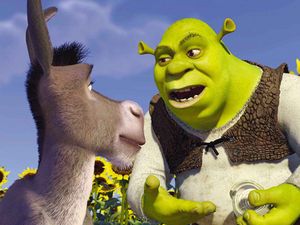Film Talk: Looking Back – Peeling back the layers with Shrek
Animated flicks are not just for kids. This is known.

Though admittedly the younger generation may often be their target audience, some of these films capture our hearts no matter how old we are, and this one still never fails to get me every time.
Directed by Andrew Adamson and Vicky Jenson, 2001’s Shrek is a comedy masterpiece that just makes you feel good about life. A story of underdog triumph and the importance of never judging a book by its cover, the film is based loosely on the 1990 fairy tale picture book of the same name by William Steig.
Brought to life by an all-star voice cast, Shrek features the impeccable talent of Mike Myers, Eddie Murphy, Cameron Diaz, and John Lithgow at the head of the pack. Parodying a plethora of classic fairy tales, the flick follows an ogre called Shrek (Myers), who finds his swamp overrun by banished fairy tale creatures being persecuted by the corrupt Lord Farquaad (Lithgow), who has aspirations to make himself king of the realm.
Shrek however only cares about getting the peace and quiet of his less-than-desirable home back, and as such may have no choice but to embark on an unlikely adventure as an even more unlikely hero.
With big names leading the cast, expectations for this animated extravaganza were high. But would it deliver, and make the fairy tale dreams of its makers and audiences alike come true?
In the land of Duloc, the scheming and heartless Lord Farquaad has banished all fairy tale beings to a swamp, and set his sights on building a kingdom just like him – dull beyond compare.
Helpless and fleeing Farquaad’s wrath, the enchanted creatures seek out the protection of the swamp’s sole-resident, the curmudgeonly ogre, Shrek.
Very much a creature of solitude, more used to villagers sharpening their pitch forks at the sight of him than being a hero for the cute and cuddly, Shrek sets out to persuade Farquaad to give him his swamp back, demanding the fairy tale refugees be moved elsewhere.
Instead, however, a deal is made that will lead Shrek on a path he never quite imagined. Farquaad, who wants to become a king, sends Shrek to rescue the legendarily beautiful Princess Fiona (Diaz), whose hand in matrimony will secure Farquaad’s throne. In return, the swamp will be Shrek’s alone once more.
Rescuing the princess however will not be easy, as with only the help of high-spirited talking Donkey (Murphy), Shrek must contend with a fire-breathing dragon, as well as the will of the princess herself.
As Shrek and Donkey do their best to complete their quest, Shrek reveals that there is much more to ogres than meets the eye, and learns a secret about the princess that may change everything...
Praised for boasting adult-oriented humour while still catering to children, Shrek grossed $484.4 million worldwide against a production budget of $60 million. It premiered at the 2001 Cannes Film Festival, where it competed for the Palme d’Or, making it in fact the first animated film since Disney’s Peter Pan to be chosen to do so.
Shrek went on to earn six BAFTA nominations, ultimately winning Best Adapted Screenplay. It also picked up an Oscar for Best Animated Feature. The flick’s resounding success helped establish DreamWorks Animation as a prime competitor to Pixar, and three sequels – 2004’s Shrek 2, 2007’s Shrek the Third and 2010’s Shrek Forever After – were subsequently released. And always the mark of a winning flick, Shrek has also been adapted into a popular stage musical.
With superb performances from all involved including a now-iconic turn from Murphy, Shrek is a joy to revisit time and again and, true to its major theme, is nothing less than magical.
In need of a pick-me-up? Stick it on – you will never be disappointed.





